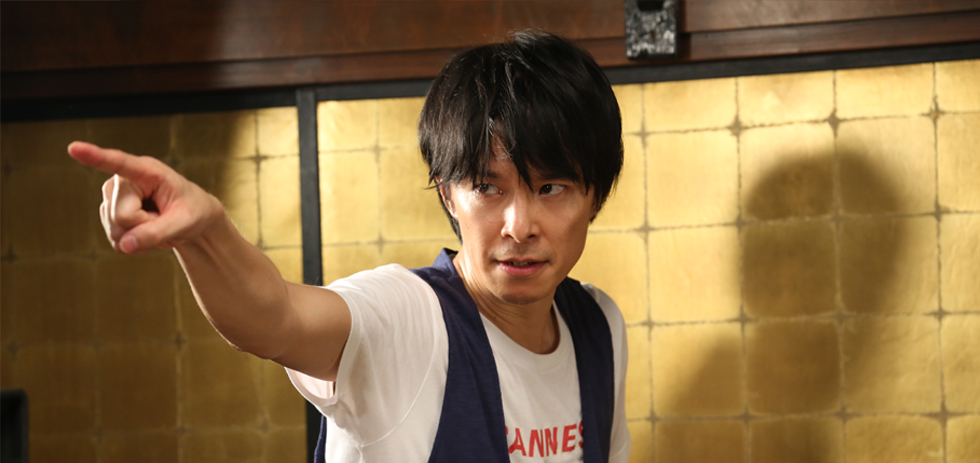
Why Don’t You Play in Hell poses a difficult, yet perpetually reoccurring situation to a reviewer — dealing with viewing a film within the wider context of a director’s output. Is it possible to view a film as something detached from a directors entire output? In the case of Sion Sono, this is increasingly difficult. His previous film, The Land of Hope was a sombre, subtle and successful mediation on the Japanese earthquakes – with a bit of a twist; it was reverent, it was well-written and the performances, although melodramatic at times, felt highly appropriate for the script. That said, something was off with the film, something that felt incomplete — it wasn’t Love Exposure. Strange Circus and Suicide Circle, both incredible Sono films, were critically lauded upon release as fresh, challenging and highly cogent statements of Sono’s particularly unique approach to cinema. With 2008’s Love Exposure, the director took his established filmic statement of intention and completely eviscerated it. With a four and a half hour masterpiece, which moved from a critique of upskirt photography into an absurd portrayal of an extreme organised religion, the film offered something completely new to the cinematic world — incredibly weird, funny and intensely serious at the same time, and leaving a broad amount of the interpretation to the audience whilst offering copious philosophical mediations on its own.
This is where the problem of watching a Sono film with a post-Love Exposure perception emerges. It’s impossibly hard to live up to a film like that without embarking on the same scope, and Sono has shown no intention of engaging with that kind of breadth or depth since the film emerged. That said, Why Don’t You Play In Hell is a movie that deserves to be watched, and one that does a lot of impressive work in the markedly different genre it works within. Having established an overarching imperative that Love Exposure is a film that must be seen, the rest of this review will focus on Sono’s latest film as an independent work — because, when it comes down to it, it is.
As with most Sono films, Why Don’t You Play In Hell has a spectacularly fast pace with a sense of action not present in the The Land of Hope. The richest scenes, however, are literally doused in blood — as in one memorable scene a room filled with the substance is panned through over multiple angles in an over saturation and visual hyperbole that few directors could pull off. Sono’s ability to do so lies in his constant subtle exposition of the absurd, something that punctuates his entire output. In his latest film, this is most frequently expressed through the constant yet never excessive violence as well as the often cliche and absurd premise on which Sono constructs his film. What is most fascinating, though, is Sono’s great strength of taking something that most would view as fairly over-the-top, before embracing it and creating something that comes off as wholly serious and engaging.
The film’s intricacies lie in one of the more multi-faceted plots of the festival, which takes place in a meta-level battle between a film crew who refer to themselves as the “Fuck Bombers” who are requested to make a film. The plot starts, like many Sono films, as something simple, almost cliche, with reference to the history of Japanese gore and exploitation films. The man who requests them to make a film is a yakuza boss and he wishes for his daughter to star in it. It quickly spirals into a film that makes political points, that critiques and praises the underbelly of Japan, whilst presenting a such an oversaturation of violence that any factor of believability can be thrown to the wayside without having to discard the rest of the film — conversely, it allows the audience to embrace it.
Sion Sono is a wildly inventive filmmaker, and he hasn’t made a film that isn’t defined by its depth; with intricate pacing of the narrative which distinguishes his work from the majority of modern Japanese cinema. His cinema is constantly fresh, and Why Don’t You Play in Hell serves as no exception. In fact, it’s the directors most entertaining and engaging film since his magnum opus. The challenge left by Love Exposure perhaps shouldn’t be viewed as something that has crippled the filmmaker’s work since, as easy as it is to construct that narrative. Instead, the absolute scale and scope of the film that has since dwarfed Sono’s preceding work should be viewed of a measure of his diversity as a filmmaker. With Why Don’t You Play In Hell, Sono has asserted that he’s going to continue to make waves in the Japanese cinema landscape; it’s taken a while but in his most recent effort the director has cemented himself as one of the nation’s most important active filmmakers.
Around the Staff:
| Dominic Barlow | |
| Conor Bateman |
